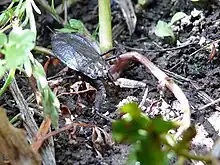| Nepa | |
|---|---|
 | |
| Nepa cinerea | |
| Scientific classification | |
| Domain: | Eukaryota |
| Kingdom: | Animalia |
| Phylum: | Arthropoda |
| Class: | Insecta |
| Order: | Hemiptera |
| Suborder: | Heteroptera |
| Family: | Nepidae |
| Subfamily: | Nepinae |
| Genus: | Nepa Linnaeus, 1758[1] |
| Synonyms | |
| |
Nepa is a genus belonging to the family Nepidae, known as water scorpions. There are six species found in freshwater habitats in the Northern Hemisphere.[2][3]
They are oval-bodied, aquatic insects with raptorial front legs. Like other members of the Nepidae, they have a pair of nonretractable cerci-like breathing tubes on the terminal abdominal segment, a characteristic which readily distinguishes them from the Belostomatidae. Their primary staples are other insects and small aquatic vertebrates. They can inflict a painful bite when handled.[4]
Etymology
'Nepa' is a classical Latin word for a 'scorpion' or 'crab'.[5]
Species

The following species are included in Nepa:[2][3][6][7]
- Nepa anophthalma Decu et al., 1994 (see Movile Cave)
- Nepa apiculata Uhler, 1862
- Nepa cinerea Linnaeus, 1758 - type species
- Nepa dollfusi Esaki, 1928
- Nepa grandis Linnæus, 1758
- Nepa hoffmanni Esaki, 1925
- Nepa monteilsensis Nel, 1988
- Nepa plana Sulzer, 1776
- Nepa remyi Poisson, 1961
- Nepa rubra Linnaeus, 1758
- Nepa rustica Fabricius, 1775
- Nepa sardiniensis Hungerford, 1928
- Nepa seurati Bergevin, 1926
Among these, N. apiculata of eastern North American (Canada and United States), and N. cinerea of Europe, northern Africa and northern Asia, are widespread.[2][4] The remaining have restricted ranges in Corsica, Sardinia, Romania, Morocco and northeastern Asia.[2][3] One of these, N. anophthalma, is the only cave-adapted species in the family Nepidae, found in Movile Cave.[3]
Linnaeus listed a number of additional species in his description of the genus, most of which either are considered synonyms or have been moved to other genera.
References
- ↑ Carl von Linné (1757). Systema naturae (10 ed.). p. 440.
- 1 2 3 4 S.L. Keffer; J.T. Polhemus; J.E. McPherson (1990). "What Is Nepa hoffmanni (Heteroptera: Nepidae)? Male Genitalia Hold the Answer, and Delimit Species Groups". Journal of the New York Entomological Society. 98 (2): 154–162.
- 1 2 3 4 Vasile Decu; Magdalena Gruia; S. L. Keffer; Serban Mircea Sarbu (1994). "Stygobiotic Waterscorpion, Nepa anophthalma, n. sp. (Heteroptera: Nepidae), from a Sulfurous Cave in Romania". Annals of the Entomological Society of America. 87 (6): 755–761. doi:10.1093/aesa/87.6.755.
- 1 2 Donald Borror; Richard White (1970). A field guide to the insects of America north of Mexico. Houghton Mifflin. p. 114. ISBN 978-0-395-07436-7.
- ↑ 'Nepa' on latin-dictionary.net
- ↑ 'Nepa' on ITIS.gov
- ↑ GBIF: Nepa Linnaeus, 1758
External links
 Media related to Nepa at Wikimedia Commons
Media related to Nepa at Wikimedia Commons Data related to Nepa at Wikispecies
Data related to Nepa at Wikispecies- Nepa on bugguide.net